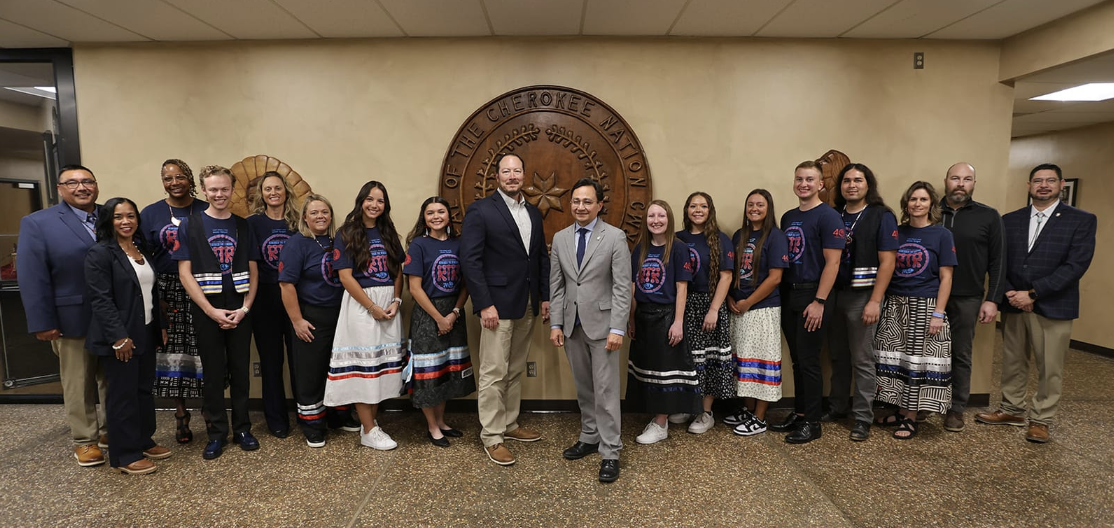
- Details
- By Native News Online Staff
Twelve cyclists from the Cherokee Nation will participate in the 2024 Remember the Removal (RTR) Bike Ride this June, retracing an estimated 950 miles along the northern route of the Trail of Tears by bicycle. This year marks the 40th anniversary of the inaugural RTR Bike Ride in 1984.
The ride spans from Georgia to Tennessee, Kentucky, Illinois, Missouri, Arkansas, and Oklahoma over nearly three weeks.
“The Remember the Removal Bike Ride is an incredibly powerful way to honor the sacrifices and perseverance of our ancestors on the Trail of Tears,” Cherokee Nation Principal Chief Chuck Hoskin Jr. said. “We are proud of these 12 Cherokee cyclists who are undertaking this grueling 950-mile journey to retrace the paths our ancestors took under forced removal from our homelands. Their commitment to keeping this piece of Cherokee history alive is admirable.”
This year’s RTR team formally introduced themselves to the Council of the Cherokee Nation, Principal Chief Hoskin and Deputy Chief Bryan Warner on April 15.
Around 60 miles will be covered by the cyclists each day along the routes used by their Cherokee ancestors, who made the same trek by foot more than 180 years ago. Of the estimated 16,000 Cherokees who were forced to make the journey to Indian Territory in 1838 and 1839, about 4,000 died due to starvation, disease, and exposure to the elements.
“The 40th anniversary of the Remember the Removal Bike Ride is a solemn tribute to the thousands of Cherokees who endured the Trail of Tears,” Deputy Chief Warner said. “While a challenging endeavor, this ride allows us to forever remember their resilience in the face of profound hardship and tragedy. We wish these cyclists safe travels as they take on this meaningful journey reconnecting to our roots.”
Participants were selected based on an essay, in-person interviews and a physical to ensure they are up for the grueling challenge. The group has been training since December. As part of their training, the group spent weekends undergoing rigorous physical training and cycling on various routes throughout the Cherokee Nation Reservation.
Cyclist Jaxen Smith, 21, of Tahlequah, said he wanted to be a part of the RTR program to honor and remember his ancestors in the most authentic and passionate way that he could.
“For me, there’s no better way to retrace my ancestors’ footsteps and experiences than by going on this bike ride. Their strength and perseverance are really what I want to bring out in myself,” Smith said. “This is an opportunity I really look forward to because it gives me the chance to develop a closer bond with my culture and heritage.”
The cyclists had their family trees mapped out by a professional genealogist, providing them insight into their ancestral past as well as connecting any family links they might share with one another.
During the bike ride, cyclists will visit several Cherokee gravesites and historic landmarks. Among the sites is Blythe Ferry in Tennessee on the westernmost edge of the old Cherokee Nation, as well as Mantle Rock in Kentucky, where Cherokees spent several weeks during the harsh winter of 1838-1839 waiting for the Ohio River to thaw and become passable.
“Just how detailed we get with our history lessons ahead of the bike ride is one thing that’s been outstanding about this program,” said cyclist Taylor Armbrister, 24, of Little Kansas. “I think a lot of people know about the Trail of Tears already or are at least familiar with it, but we really dive deep into that history and get a first-hand account about the removal of our ancestors. I’ve already learned more than I would ever expect from a historical standpoint.”
The Cherokee Nation cyclists will be joined by a team of cyclists from the Eastern Band of Cherokee Indians in North Carolina. Together, they will start the ride in New Echota, Georgia, a former capital of the Cherokee Nation, in June.
For more information on the Remember the Removal
The 2024 Remember the Removal Bike Ride cyclists from the Cherokee Nation include the following:
• Taylor Armbrister, 24, Little Kansas
• Camerin Fite-James, 24, Fort Gibson
• Jaxen Smith, 21, Tahlequah
• Jaslyn Christie, 19, Fort Gibson
• Jasmine Goodman, 23, Fort Gibson
• Kiyah Holmes, 24, Tahlequah
• Lexi Melton, 22, Vinita
• Hannah Neugin, 18, Muskogee
• Shawna Baker, 45, Tulsa
• Heather Fite, 46, Fort Gibson
• Ashawna Miles, 50, Tahlequah
• Kristy Ross, 49, Pryor
More Stories Like This
Native News Weekly (August 25, 2024): D.C. BriefsNavajo Nation Mourns the Passing of Former Vice President Rex Lee Jim
Deb Haaland Earns Endorsement From Communications Workers of America Local 7076
University Soccer Standout Leads by Example
Two Native Americans Named to Democratic Congressional Campaign Committee's“Red to Blue” Program
Help us defend tribal sovereignty.
At Native News Online, our mission is rooted in telling the stories that strengthen sovereignty and uplift Indigenous voices — not just at year’s end, but every single day.
Because of your generosity last year, we were able to keep our reporters on the ground in tribal communities, at national gatherings and in the halls of Congress — covering the issues that matter most to Indian Country: sovereignty, culture, education, health and economic opportunity.
That support sustained us through a tough year in 2025. Now, as we look to the year ahead, we need your help right now to ensure warrior journalism remains strong — reporting that defends tribal sovereignty, amplifies Native truth, and holds power accountable.
 The stakes couldn't be higher. Your support keeps Native voices heard, Native stories told and Native sovereignty defended.
The stakes couldn't be higher. Your support keeps Native voices heard, Native stories told and Native sovereignty defended.
Stand with Warrior Journalism today.
Levi Rickert (Potawatomi), Editor & Publisher


